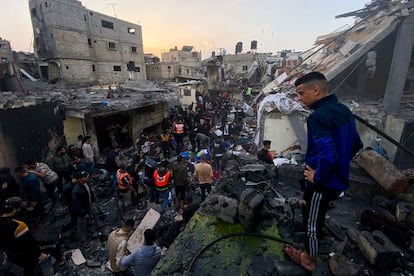Netanyahu has turned Gaza into a living hell
From the moment he came to power, Israel’s prime minister made his radical stance against the Palestinians clear

In April 1956, Chief of Staff Moshe Dayan, one of the toughest commanders in the Israel Defence Forces, had to say a prayer at the funeral of a young farmer who had been killed by Palestinians during a raid on the Nahal-Oz kibbutz. “Let us not hurl accusations against them today,” Dayan said. “Why should we complain about their fierce hatred toward us? For eight years they have been settled in refugee camps in Gaza while, before their very eyes, we have made our homes on the land and in the villages where they and their ancestors have lived.” Dayan felt the responsibility for the death of the farmer lay with them, the Israelis. “Let us not be frightened to see the hatred that accompanies and consumes the lives of hundreds of thousands of Arabs around us waiting for the moment when their hands can be stained with our blood,” added Dayan, who wore a patch over one eye. “This is the fate of our generation. The only choice we have is to be prepared and armed, to be strong and resolute or else the sword will slip from our hands and the threat against our lives will increase. We are a generation of settlers, and without the steel helmet and the cannon, we would not be able to plant a tree or build a house.”
The episode is recounted in The Iron Wall by Avi Shlaim, a historian born in Baghdad in 1945 into a well-to-do Jewish family and one of the leading specialists on the Middle East today. The Iron Wall is one of the best books for understanding the relationship between Israel and the Arab world.
Dayan said these words at the funeral a long time ago, but they still serve to illustrate the magnitude of the wound that tears apart those who live in a region split in two with the approval of the United Nations in 1947, in order that one Jewish and one Arab state would emerge. Since then, the region has been afflicted by wars, ever more deeply rooted hatred, deportation, terror, questionable policies, the shifting of borders, illegal settlements and occupation of Palestinian territory, and the internationalization of large and small disputes culminating in a recurring nightmare.
In Shlaim’s book, which covers the period from 1948 to 2006, Benjamin Netanyahu first appears in 1996 as the leader of the right-wing Likud party when he defeats Shimon Peres’ Labor party in the elections. All tentative attempts to achieve peace were set aside. Netanyahu had just published a book in which he argued that “the Palestinian problem was not a real problem, but had been artificially created,” says Shlaim. He advocated a “religious-nationalist ethnocentric” government and considered the Palestinians to blame for everything, including international terrorism and its techniques which, he said, were their invention and “export par excellence.” These ideas have surely fueled the devastating response in Gaza to the brutal October 7 Hamas massacre, creating what is unquestionably a living hell.
Sign up for our weekly newsletter to get more English-language news coverage from EL PAÍS USA Edition
Tu suscripción se está usando en otro dispositivo
¿Quieres añadir otro usuario a tu suscripción?
Si continúas leyendo en este dispositivo, no se podrá leer en el otro.
FlechaTu suscripción se está usando en otro dispositivo y solo puedes acceder a EL PAÍS desde un dispositivo a la vez.
Si quieres compartir tu cuenta, cambia tu suscripción a la modalidad Premium, así podrás añadir otro usuario. Cada uno accederá con su propia cuenta de email, lo que os permitirá personalizar vuestra experiencia en EL PAÍS.
¿Tienes una suscripción de empresa? Accede aquí para contratar más cuentas.
En el caso de no saber quién está usando tu cuenta, te recomendamos cambiar tu contraseña aquí.
Si decides continuar compartiendo tu cuenta, este mensaje se mostrará en tu dispositivo y en el de la otra persona que está usando tu cuenta de forma indefinida, afectando a tu experiencia de lectura. Puedes consultar aquí los términos y condiciones de la suscripción digital.









































